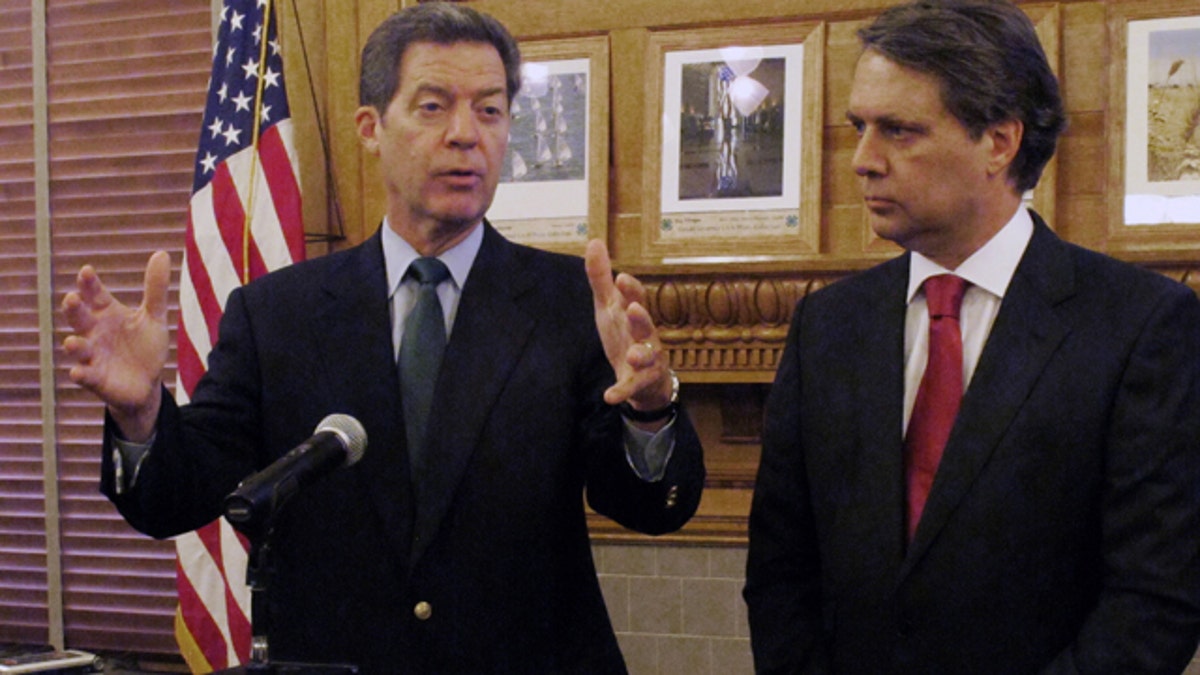
FILE - In this Sept. 11, 2014 file photograph, Kansas Gov. Sam Brownback, left, and Lt. Gov. Jeff Colyer speak at the Statehouse in Topeka. (AP Photo/John Hanna, File)
WICHITA, Kan. – A federal grand jury is looking into loans made to Kansas Gov. Sam Brownback's re-election campaign and has ordered the state's ethics chief to testify next week as part of its investigation, according to a subpoena obtained by The Associated Press.
Carol Williams, the executive director of the Kansas Governmental Ethics Commission, was summoned to appear before the grand jury Wednesday in Topeka, according to documents the AP obtained through an open records request. She also was ordered to provide documents pertaining to loans Brownback's campaign received in 2013 and 2014.
The subpoena doesn't say which loans are being investigated, but the only loans listed on campaign disclosure reports for those years are one from Brownback and others from Lt. Gov. Jeff Colyer. Colyer loaned Brownback's campaign $500,000 in August -- the third such loan the governor's running mate made to their re-election bid -- according to a disclosure report filed days before the November election.
The loans, the first of which was made in December 2013, raised eyebrows on the campaign trail because loans in such large amounts are rare in Kansas political races and because the money was repaid within days.
Brownback's spokeswoman, Eileen Hawley, said the investigation "has no merit."
"It is a common practice for candidates to make loans to their campaigns and any loans were done in compliance with Kansas law and ethics regulations," she said in an email.
When asked in August about the reasoning for the loans and repayment, Brownback said, "I'm not going to explain the thought process."
Some Democrats speculated Thursday the loans were an attempt to bolster Brownback's fundraising totals, to make the campaign appear in better shape than it was.
"The loans were clearly a tactic to deceive Kansas voters," said Senate Democratic Leader Anthony Hensley, who called the situation a "dark cloud" on the governor's inauguration and legislative session set to begin Monday.
A spokesman for Democrat Paul Davis, who narrowly lost the race to Brownback, said before the election that voters "deserve to know where this money came from." Davis declined comment Thursday.
Craig Holman, government affairs lobbyist for the campaign finance watchdog Public Citizen, said a political motivation for the loans wouldn't have sparked the grand jury probe. Although the loans themselves are probably legal, Holman said, the timing of them repeated three times is "quite suspicious." He said it's not clear what the grand jury is investigating, but pointed out a federal panel likely wouldn't probe a state campaign just because of alleged finance violations because such races don't fall under federal campaign finance laws.
"If there is an actual grand jury investigation going on, then there is something beneath those loans," Holman said.
Brett Berry, general counsel for the ethics commission, released the subpoena, which the agency received on Dec. 9, through the open records request, but otherwise declined comment. The U.S. attorney's office and Williams also declined to comment.
Colyer, a reconstructive plastic surgeon, told the AP in August that the first two $500,000 short-term loans he made to Brownback's re-election campaign are examples of the good stewardship Kansas residents expect from government officials.
"It was just simple cash management," Colyer said. "It's good money management, that's all. That's what you'd expect for me to do with the state's money, too, is to manage it well. We manage our campaign well -- that's it."
Earlier finance reports indicate that Colyer made his first $500,000 loan on Dec. 31, 2013, the last day covered by a finance report due in early January 2014, and it was repaid on Jan. 2, 2014. He then made a second $500,000 loan on July 23, 2014, the second-to-last day covered by a finance report due in late July. That loan was repaid two days later, when a new reporting period started.
The third $500,000 loan from Colyer was made on Aug. 13, and a campaign finance disclosure filed Thursday indicated that $400,000 of that loan was repaid on Nov. 21.
Brownback also loaned his campaign $200,000, and the latest campaign filing shows that loan has not been repaid.




